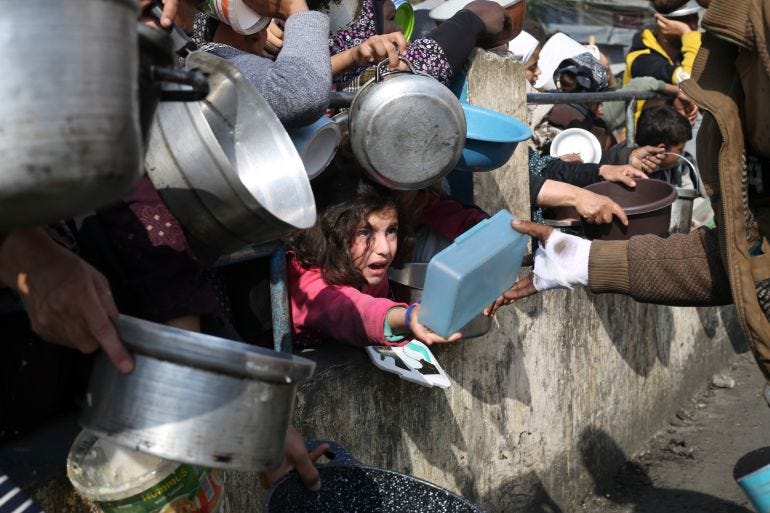UN Experts Say There Is Famine in Gaza
Famine Is Spreading the Gaza Strip With Devastating Effects on Children

In March this year, international agencies predicted that without a ceasefire and an urgent scaling up of humanitarian deliveries to the Gaza Strip, most of its population would be exposed to famine by mid-July. It is now mid-July, and that prediction has materialized, according to a group of United Nations experts. In a joint statement, UN special rapporteurs said that while we might still be waiting for a technical recognition of famine, the situation on the ground leaves no room for doubt.
A famine is officially declared when an area faces extreme food scarcity, leading to severe hunger for at least 20% of the population. Additionally, 30% of the children in the area will be dangerously underweight, and the death rate will double. In real life, the rapporteurs claim, “when the first child dies from malnutrition and dehydration, it becomes irrefutable that famine has taken hold.”
Conservative estimates quoted by the UN experts suggest that at least 34 people, mostly children, have starved to death in Gaza, with the true number likely higher. Israeli attacks on Palestinian food and agricultural infrastructure have decimated protein sources, leaving locally produced vegetables and fruits scarce and prohibitively expensive. The attacks on local production, obstructions of aid delivery, and prioritization of private sector trucks only reinforce what UN experts claim: that Israel is intentionally starving Gaza as part of its genocidal violence.
Babies conceived at the beginning of Israel’s war on Gaza, born over the past weeks, are starting life malnourished, stated Tlaleng Mofokeng, UN Special Rapporteur on the Right to Health, on Newzroom Afrika. With infant formula costing around 70 shekels (approximately 20 USD), many families cannot afford the necessary food products even if they manage to find them on the market.
Pregnant and breastfeeding women are also heavily impacted by the food shortage. Over half of breastfeeding women struggle to maintain their practice, and 99% report insufficient milk production. Anemia affects 76% of these women, indicating severe malnutrition.
Nutrition and hydration needs are higher during pregnancy and breastfeeding: approximately 500 extra calories and an extra 1 liter of water are needed in addition to the standard intake of 2000 calories and 2.7 liters of water per day. Yet, 1.5 liters of water per person is all that is available daily in Gaza, according to the Euro-Med Human Rights Monitor.
“Women do not get any food at all; no vitamins, minerals, iron, fruit, vegetables, or anything,” said Adnan Radi, a consultant OB/GYN at Al-Awda Hospital in northern Gaza.
Fearing even more reduced access to health services, some pregnant women are self-inducing labor, risking their health and their babies’. International organizations, including Save the Children, have provided emergency care for women in critical condition after such attempts.
The constant displacement due to Israeli attacks exacerbates the crisis. Many women in late pregnancy stages avoid hospitals due to security concerns and potential attacks.
The Palestine Red Crescent Society reported that ongoing attacks have once again jammed ambulance dispatches in northern Gaza. In just one week, evacuation orders from Israeli Occupying Forces have emptied three major hospitals: Al-Ahli Hospital, Patients Friends Association Hospital, European Gaza Hospital. This left only 13 partially functioning hospitals in Gaza, severely limited by fuel and supply shortages.
A ceasefire, the prosecution of those responsible for the violence in Gaza, and an end to the occupation remain the only option in order to address the health crisis that has engulfed the Strip.




